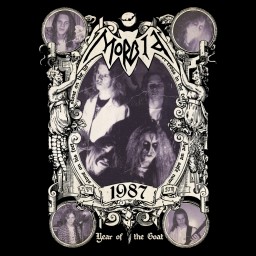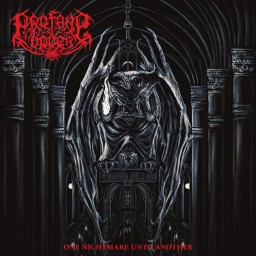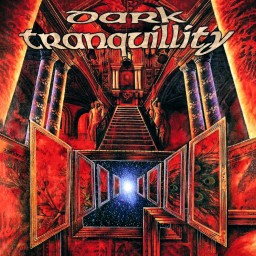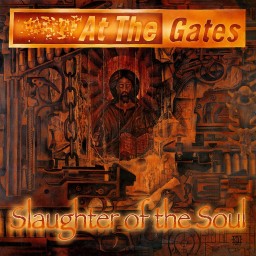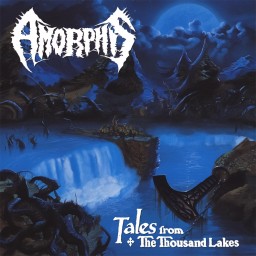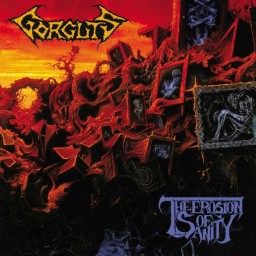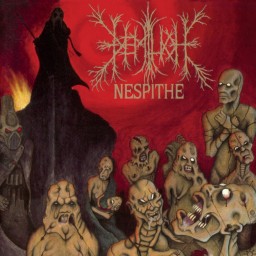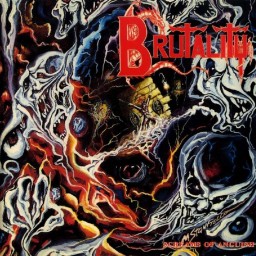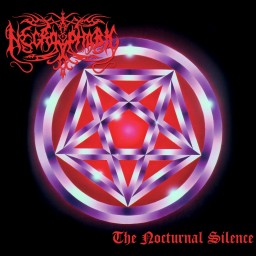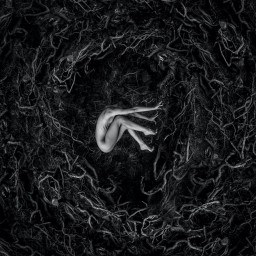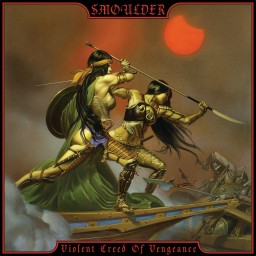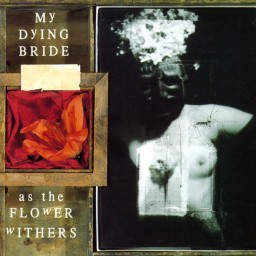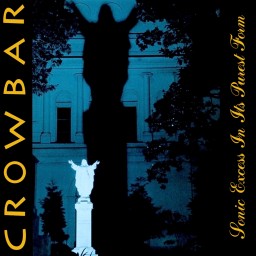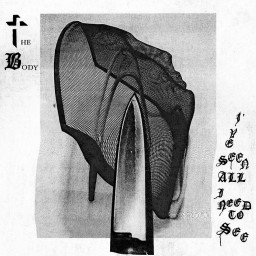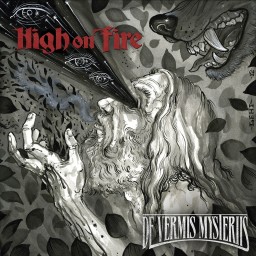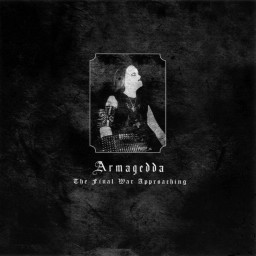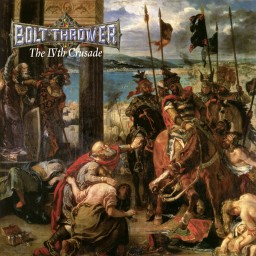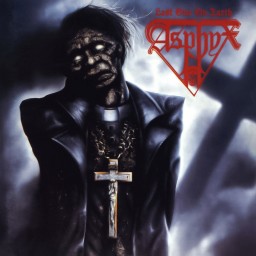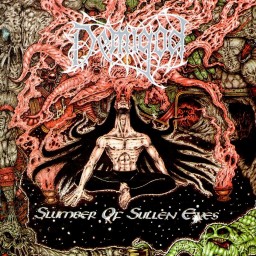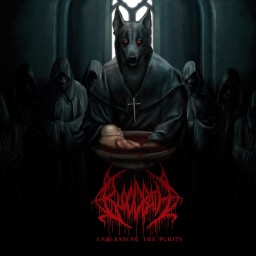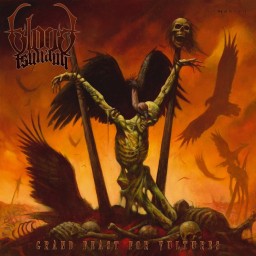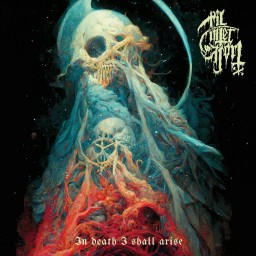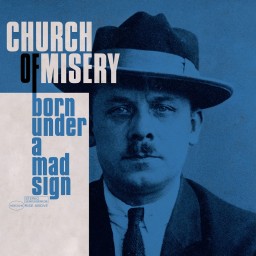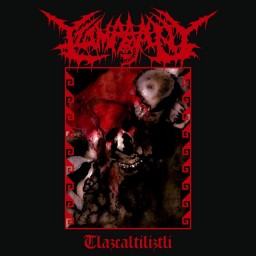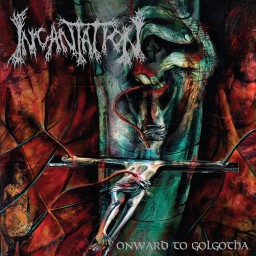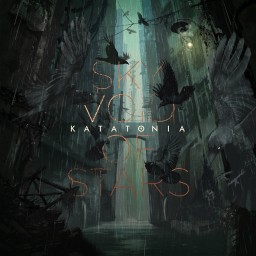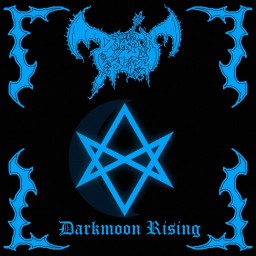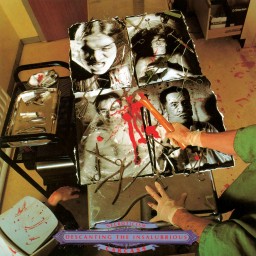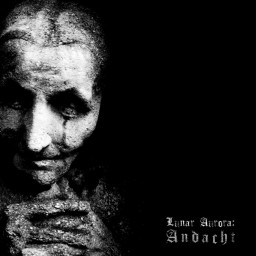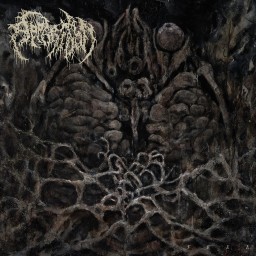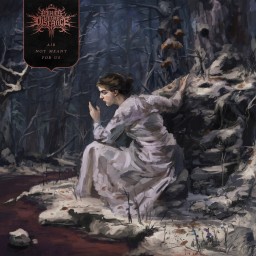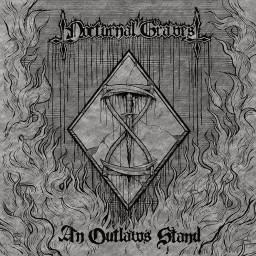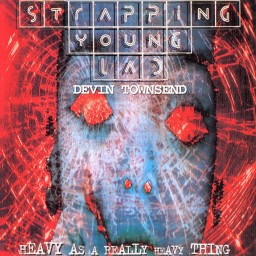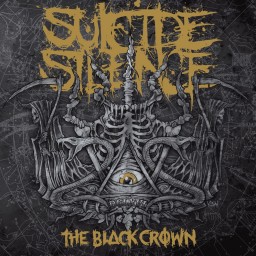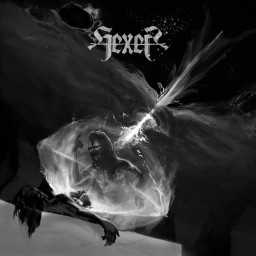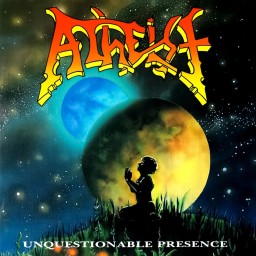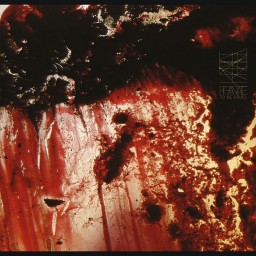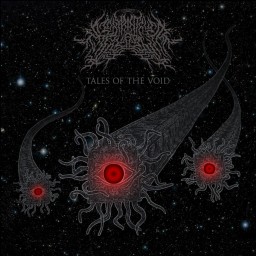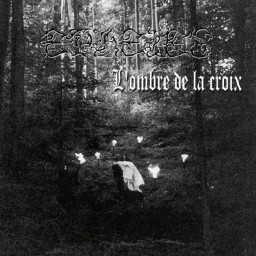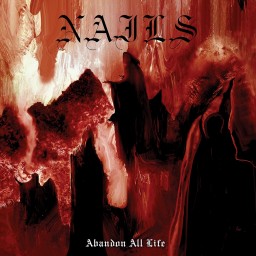Sonny's Reviews
I paid a mint for an original CD copy of Morbid's seminal December Moon demo a few years back, but it is also available here on this comp of Morbid's demos and a couple of live sets. Whether you enjoy this is dependent, I suppose, on how you feel about listening to demo and bootleg quality material. Personally I don't have a problem with it, but I understand if people do. Unfortunately Morbid, who featured legendary Mayhem frontman Dead before he joined the black metal legends, never released any official studio stuff, so this is pretty much the sum total of the band's output. The sound on the four opening tracks, which comprise the December Moon demo, is pretty good and give an indication of what great potential the Swedes had, especially considering this was recorded in 1987. The sound quality of the rest of the tracks is not so great, but if you are conversant with 80s demos and bootlegs you will have heard far worse! The remaining six tracks on CD1 are rehearsal recordings of December Moon's four plus a short instrumental, Citythrasher, and the track Deathexecution which was the opener on an earlier cassette only demo, Rehearsal 07/08/1987. All these tracks are great examples of the melting pot that was underground metal of the mid-to-late 1980's with thrash metal mutating into the bastard twins death and black metal and bands being unafraid to explore new realms of extremity.
The live material is taken from two shows, the first from a show at Stockholm's Birkagarden recorded in late October '87 (this show is available as the 2000 album Live in Stockholm) and the second was recorded earlier in the year, in April, at the Ultrahuset also in Stockholm. The sound isn't great and the crowd noise is obtrusive, but these two shows give an insight into the early Scandinavian extreme metal scene and it is always great to hear a Dead live show (if you know what I mean)!
So, as a record of an important underground band that was influential in the very early years before the explosion of Scandinavian extreme metal, this is interesting stuff and, despite any qualms about the quality, these six or seven songs are fucking awesome. To be honest, I kind of love this dodgy-sounding crap to hell so I'm like a pig in shit with this sort of thing.
Genres: Black Metal Death Metal Thrash Metal
Format: Compilation
Year: 2011
I think it is fair to say that most people see black metal as a cold genre. It isn't just it's fascination with the northern realms of forests, mountains, ice and snow, but also a coldness of emotion and a steely, frigid and spiteful attitude to everything from death to religion. War metal, however, I would suggest, is a very hot genre, it's atmosphere and aesthetic feeling very much like a flaming blast of furnace-heat as if issuing from the very gates of Hell itself. This is an atmosphere that Profane Order have replicated on One Nightmare Unto Another exceedingly successfully. The tracks here are blistering and fiery affairs that seethe with a hot-blooded rage and visceral savagery so typical of the war metal aesthetic.
What it doesn't have, however, is the muddy and messy production that can sometimes render war metal releases into barely discernible blurs of chaos. This isn't by any means a precise production job as you may hear on a tech-death album for example, but it also doesn't neuter the visceral power of the tracks under a cloying layer of muddiness, rather striking a decent balance between chaos and legibility. The sound is thick and chaotic, exhibiting the looseness I associate with war metal that says "these guys are barely hanging on by their teeth" as they pummel and pulverise their way through the album's twenty-five minutes. Not always typical for war metal, though, the riffs are perfectly audible and show a bit more variation than may sometimes be on offer, such as during the slower, more brooding moments of closer Of Bile and Malice.
I surely love me some Blasphemy and Beherit, but I am not such a "trve" war metal purist that I believe you should barely be able to discern any sort of riff or melody to experience that authentic death metal experience, so I am perfectly good with this kind of production job, because behind it Profane Order still have that unquenchable war metal fire in their bellies as they spit out savage and brutally blistering salvos of incendiary hatred and blasphemy.
Genres: Black Metal
Format: Album
Year: 2023
I have been listening to this over the last couple of days in conjunction with At the Gates' Slaughter of the Soul. Both bands being instrumental in the development of what became known as "The Gothenburg Sound", the two albums were released a mere fortnight apart. I must admit that, of the two, I prefer this as there is just a bit more to interest me than with Slaughter of the Soul. A big plus for me is Mikael Stanne's vocals which I much prefer over Tomas Lindberg's. His singing style is still very aggressive, but sounds to me like it has more of a black metal flavour than a hardcore one. The riffs may be less memorable than At the Gates' best, but the guitars don't sound quite as swamped in distortion and as such pack a greater punch to my way of thinking.
The most striking thing about The Gallery, though, is the production which is a revelation. Each of the instruments can be heard distinctly and clearly, the biggest benefactor of this being bassist Martin Henriksson whose bass lines are perfectly audible and as a consequence it is easy to hear what a terrific job he does weaving his lines in with Anders Jivarp's pummelling drum patterns. It also allows us to easily distinguish between the lead work of the two guitarists and generally gives the whole album a crisper sound than is often the case with Swedish death metal. I also feel that The Gallery scores over Slaughter... in that it has more variety, with the inclusion of slower sections, acoustic parts and even female vocals to provide some contrast to the pulverising riffs. The Gallery also sees Dark Tranquility dabble a bit more with technicality than AtG, although I don't wish to overegg it, this certainly isn't tech-death, but the rhythms and leads sound more complex and technically specific than those on Slaughter of the Souls.
I don't wish to set this review up as a competition between the two albums, it has just come out like that as a consequence of my listening to them that way, comparisons between two pioneering albums of the same genre, released days apart becoming inevitable. Anyway, I'm giving it to The Gallery on a TKO. This is an album I am likely to return to again in the future for sure.
Genres: Death Metal
Format: Album
Year: 1995
At the risk of becoming increasingly repetitive, At the Gates are yet another band I have encountered on my journey through death metal's beginnings, about whom I know very little, despite previously having seen their name all over the place. This time, though, after actually listening to them, I am not filled with the feeling that I have been missing out. It's not that this is terrible or anything like that, in fact it is extremely tight and aggressive. It's just that, to my untrained ears, it sounds like an awful lot of the metalcore that I have encountered whenever I have ventured into Revolution territory and as such it doesn't really float my boat that much. From what I gather, this was enormously influential and a pivotal release in the development of melodeath and the "Gothenburg Sound", neither of which I am much of a fan of, so it was always going to be a bit of a reach for me.
On the plus side, the riffs come thick and fast and, at times, are fairly memorable, even though the guitar sound is of the Entombed / Dismember, heavily distorted Swedish style of which I am not the world's biggest fan. The rhythm section of bassist Jonas Björler and drummer Adrian Erlandsson work really well together and sound like a very tight unit, providing a lot of muscle to back up the frantic riffing. I don't really go for the hardcore-derived vocal style of singer Tomas Lindberg, I much prefer my death metal with the gutteral growls of Reifert, Vincent and Chuck to this "shouty" style which very often rubs me up the wrong way wherever I encounter it and is probably the most offputting aspect of the album for me.
I can definitely hear how influential this album has been upon not only no end of melodeath wannabees, but also on the development of metalcore, the earliest practitioners of which must have been well acquainted with this. I would have to say that this is a very good example of a style of metal that I am not the biggest fan of and, a bit like my attitude towards Trivium's In Waves, it is an album I would probably only return to when I was in a mood for something different from my usual fare, acknowleding it as important in the development of metal and being enjoyable enough in it's own right, without it really resonating with me on a personal level.
Genres: Death Metal
Format: Album
Year: 1995
I am finally on a bit more familiar territory with an album I have known for quite a while. Tales From the Thousand Lakes is actually one of the first albums I got into when, after a hiatus of several years, I ventured back into metal in the late nineties and it was one of those I got a dodgy copy of using that new-fangled Napster thingy, so beloved by Lars Ulrich & co.
Tales... is the band's sophomore full-length, following 1992's The Karelian Isthmus and is a concept album based around the Finnish national epic poem known as The Kalevala. The first half of the nineties found most death metal bands pushing the boundaries of extremity, whether through increasing technicality, plumbing greater depths of cavernous doominess or just sheer bloody-minded brutality, becoming more and more extreme seemed to be the order of the day. Amorphis, however, pursued another route entirely, whereby the story was the key and the music to express it needed to be more accessible and expansive than mere technicality or brutality would allow. Tales From the Thousand Lakes is absolutely rooted in death metal, but it also has much more going on. The darkness of violence, blasphemy and evil which were the staples of death metal's ethos and aesthetic up to this point are entirely absent and TFtTL has a far lighter and airier feel that any death metal I have heard that was produced prior to this. It displays an epic nature that borrows from classic heavy metal and even Candlemass' style of epic doom metal with an expansive style that suits the material beautifully and breaks the mould for death metal, the songs incorporating a previously unknown level of melodicism into the genre. As a consequence every track has it's own atmosphere, yet they all flow together magically, to produce a coherent and consistent album that is accessible, aesthetically pleasing and incredibly memorable. Into a death metal-based foundation is woven folk metal and progressive elements with a variety of vocal styles from DM's usual deep growls to soaring cleans and a creative use of keyboards at key points without overdoing this side of things. This is a point that needs emphasising, I think, despite using potentially cheesy and overblown styles like folk and progressive metal, the album itself never descends to cartoonishness and is incredibly restrained and tasteful throughout it's runtime.
Undoubtedly Thousand Lakes was incredibly influential and I wouldn't be at all surprised if fellow Finns and symphonic metal flag-bearers Nightwish weren't heavily influenced by it, along with any number of more obvious melodic death metal outfits. This is assuredly a lightning-in-a-bottle, one-of-a-kind album that any number of bands (including Amorphis themselves) have attempted and failed to replicate anything like as successfully and it is a testament to original songwriting and strong storytelling emerging from the extreme metal scene of the 1990s. A classic of melodic and atmospheric extreme metal.
Genres: Death Metal
Format: Album
Year: 1994
Gorguts released their debut, the meat and potatoes death metal album Considered Dead, in 1991. Seven years later and about three hundred light years removed from the debut they released the much-lauded, technical, avant-garde death metal album Obscura, an album, my own struggles with which I have documented elsewhere. Despite my problems with Obscura, even I can hear that these sound like two completely different bands, yet somehow they travelled from one to the other and the journey they were taking, during a pitstop in 1993, produced The Erosion of Sanity.
I wouldn't say that The Erosion of Sanity sits midway between Considered Dead and Obscura, it still retains too many of the fundaments of death metal for that, but it does drop massive hints as to the direction of travel that Gorguts were taking as they developed their sound from, frankly, the Death copyists that were represented on the debut to the out-there boundary-pushers that they were to become. For me personally Erosion of Sanity hits a bit of a sweet spot between the solid, but unoriginal death metal of their earlier days and the indigestible technicalities of their infinitely more challenging and complex later work. This is an extremely tight-sounding album with the band hitting all their marks superbly. The riffs are tight and brutal-sounding and are supported by the rhythm section that pounds out dynamic and original-sounding patterns, with the bass sitting high enough in the mix to have a higher than usual impact upon the overall sound to great effect. Luc Lemay's harsh, throaty bark sounds vicious, yet the lyrics are still perfectly understandable, despite this invective-filled, spitting delivery. Where I feel that Erosion of Sanity scores over a lot of technical death metal in the same way that Death's Human does, is that the displays of technical prowess in both execution and songwriting don't interrupt the flow of the tracks and what we still have at the root of it all is a slab of heavy as hell and brutal death metal with killer riffs and exhilarating lead work.
There is far more going on here than was presented on Considered Dead and the band's evolution in a mere couple of years was quite remarkable, but there were wholesale changes to Gorguts' lineup after Erosion of Sanity, with guitarist/vocalist Luc Lemay being the only member appearing on both Erosion and Obscura. I am guessing this meant that Lemay was the instigator of Gorguts' move in a more avant-garde direction and his judgement was that his fellow band members either weren't on board with that direction of travel or weren't technically gifted enough to pull off his vision of where he wanted the band to go. For me, however, this is an excellent example of technical death metal that still retains what makes death metal exciting without becoming too "cerebral" and losing me. Whilst Obscura and their later complex works seem to be what Gorguts are best known for, they aren't for me and I will stick with this and hold it up as an example of what I personally look for in tech-death circles.
Genres: Death Metal
Format: Album
Year: 1993
Demilich's sole release Nespithe is an album whose name I have seen dropped all over the place. However, it being tagged as technical death metal has always found me looking the other way and filing it under the heading "nothing to do with me". And now, after finally listening to it, I have got to say, "Fuckin' wow!!" I genuinely don't think I have ever heard an album so out there that I have actually enjoyed as much as this. With it's bizarre, seemingly nature-defying, technicalities and the inhuman sub-sonic growls that pass for vocals this is like the very personification of H.P. Lovecraft's stories of impossible realms and sanity-destroying astral horrors. I can see why Demilich never released another album as I cannot even conceive of how you would follow this up. In fact, it seems like three of the four members fell out of the metal scene altogether after Demilich split following it's release - and I understand why. This is the death metal equivalent of Lovecraft's legendary tome, The Necronomicon, a book so horrifying it causes any who read it to go completely insane.
All hyperbole aside, I don't possess the technical musical knowledge to even begin to explain what is going on here with Nespithe, other than to say that it is quite unlike anything I have ever heard in it's seemingly chaotic grooves and it needs to be heard to be believed. It seems on the surface to be exactly the sort of technical exercise I would normally hate, but for some reason it's constantly shifting sounds overlaid by that smothering inhuman growling just appeals to something inside me. I have seen any number of complaints about those vocals, but I think they are some of the most fascinating I have ever heard, the sheer depth of the croaking growl genuinely sounding like the proclamations of some extra-dimesional deity. The lyrics too are suitably eldritch and hint at multi-dimensional horrors whose only reason is to destroy the minds and souls of the human race, to which Antti Boman's voice gives perfect expression.
Where Nespithe scores high over most other technical death metal for me, is because it is so dripping with atmosphere and that is something I think is ignored by most technical DM bands, Nile perhaps being the only other technical outfit I know of who put any store in atmosphere... but Demilich take it to a whole new level that even leaves the Egypt-obsessed Nile floundering. The four band members are evidently supremely talented musicians to pull off such intricate instrumentation and that combined with such a singular, horror-invoking atmosphere gives this a real one-of-a-kind feel. One thing is absolutely certain, once you have heard it, this is not an album you are ever likely to forget. For me, this is a classic.
Genres: Death Metal
Format: Album
Year: 1993
Brutality were unknown to me prior to listening to this (surprise, surprise), but are another product of the Nineties' Florida death metal scene that spawned so many DM classics and one listen to Screams of Anguish and it is obvious that it originated in Tampa. While it does possess the brutality of the classic Tampa sound, it also has a slight technical bent to it that, presumably, differentiated it from the Morbid Angels and Deicides of the time. It isn't excessively technical and Brutality are as capable of being wilfully bludgeoning as any other of Tampa's death metal denizens, but there is enough there to set it apart. The lead work in particular is something that caught my ear, with the howling solos being one of my favourite aspects of the album as their scalpel-like sharpness provides a perfect counterpoint to the blunt force trauma of the bludgeoning rhythm work. Vocalist Scott Reigel has a classic death metal style of ascerbic growling that sounds like it could strip paint and the rhythm section provides the perfect heavy-boned skeleton on which guitarists Don Gates and Jay Fernandez can hang their muscular riffs.
One point of contention for me was the two interludes, Sympathy and Spirit World, which I think sucked the velocity out of the album. During each of these breaks in the sonic battery I was champing at the bit for them to launch back into the attack and felt these acted like speed bumps on a racetrack, being superfluous and disruptive of the flow. I understand the inclusion and maybe the band wanted to give the listener a respite and a chance to regroup before setting about them once more, but without them in the tracklisting I think we would have had a perfect blistering and belligerent sub-forty minute album.
Anyway, minor tracklisting niggle aside, this is an album I enjoyed massively with it sitting somewhere between early Deicide and mid-era Death to my ears with those searing solos being the big take away for me. On the strength of this debut, I really can't believe that these guys aren't as big a name in the Florida scene as Death, Deicide or Morbid Angel.
Genres: Death Metal
Format: Album
Year: 1993
Necrophobic are yet another band I have been ignorant of up until listening to this, the Swedes' debut album, for the Horde's death metal the first decade clan challenge. I guess I was expecting something akin to Entombed's first couple of albums, but instead Necrophobic have thrown me a bit of a curveball by including black metal elements within their death metal assault and, I've got to say, I'm quite impressed. I don't want to try and oversell the black metal elements because this is definitely a death metal album, but they are noticeable and the inclusion of those elements does make for something a bit different compared to the other death metal releases I have been listening to from this period in time. Blackened death metal is a well-established sub-genre nowadays, of course, and there are a legion of releases under the umbrella, but I guess this is one of the earlier examples.
They do have that overdriven Swedish guitar sound as employed by the likes of Entombed, but it is tempered by the blackened elements with the extra treble giving it a bit more clarity. That said, it does provide the listener with a damn good bludgeoning in true death metal style and doesn't lack for heaviness in any way, even when guitarist David Parland introduces a bit more melody into the riffs the brutal guitar tone still delivers a damn good beating to the listener's eardrums. The slight downside to this and an issue I have with a number of Swedish death metal releases, is that the guitar is so all-pervasive that I feel the rhythm section takes too much of a back seat and at times the bass in particular is swamped by that overpowering guitar tone.
Vocalist Anders Strokirk singing voice sits somewhere between a shrieking, barking black metal style and the more gutteral, growling vocals of death metal derivation, leaning a bit more to the black side. Lyrically and thematically they also embrace the anti-Christian path so beloved by black metal bands of the time with their blasphemous and satanic lyrical exhortations. The songwriting is strong, the tracks seem to strike a great balance between the brutal and the melodic, being both detructively heavy and memorable at the same time. A track such as Sacrificial Rites even hints at a heavy Slayer influence and at times sounds like it wouldn't be out of place on Reign In Blood. The death and black metal elements combine well to provide something that sets Necrophobic apart from the early-90's Scandinavian pack. The Swedish sound is not my favourite iteration of death metal, but with the addition of aspects of black metal Necrophobic seem to have found the formula to making it more interesting, to my ears at least.
Genres: Death Metal
Format: Album
Year: 1993
Fvnerals produce metal that is more about texture and atmosphere, rather than having any interest in traditional songwriting. As such their music has more in common with drone, ambient and post-rock, but it is nevertheless still rooted in metal and drone metal in particular. I have also seen it labelled as funeral doom but, personally, I don't think so. Musically, the bulk of the album consists of hulking, ritualistic drones laid down by songwriter Syd Scarlet's huge guitar chords and feedback, reinforced and fortified by Tiffany Ström's bowel-loosening bass and Thomas Vaccargiu's sparse drumwork. Ström's haunting vocals soar over these sonic monoliths like a super-heavy Cocteau Twins, her style of vocals being quite reminiscent of some of Chelsea Wolfe's recent work.
The tracks on display here seem to be quite simple, but everything is beautifully structured and the atmospheres and textures produced are gorgeous. Being of a somewhat fanciful nature, I find the album acting as a catalyst and back drop to flights of imagination through ancient, crumbling, cyclopean cityscapes or strange, alien, deep-sea vistas, places where sheer size and strangeness evoke a sense of wonder and awe, because that is exactly what I get from the music. FVNERALS have produced an album that gives me exactly what I seek from drone metal - something on which to hang imagination and fancy whilst still managing to crush the life out of me with huge, devastating chords.
A point where the drone metal sceptic may feel more at home regarding Let the Earth Be Silent is that the album's seven tracks only have a combined runtime of a shade over forty minutes, so this is no seemingly endless slog, with the longest track weighing in at a slight eight minutes and change. I myself tend to regard the seven tracks as movements within a single piece of music as I think they work superbly well in this regard. I think this could well have an audience outside of traditional metal circles with fans of ritual and dark ambient, darkwave, or even ethereal wave, who can shelve any prejudice against it's metal roots.
A favourite of mine to which Let the Earth Be Silent can be compared is Bismuth's The Dying of the Great Barrier Reef, so anyone who feels positively towards that should feel well at home here as it displays the same dichotomy between awe-inspiring majesty and a distinct uneasiness.
Genres: Doom Metal Drone Metal
Format: Album
Year: 2023
I really enjoyed Smoulder's 2019 debut, Times of Obscene Evil and Wild Daring, their female-fronted epic doom metal was quite a revelation at the time, so much so that I bought myself a vinyl copy from their Bandcamp page. They followed the debut, scarcely a year later, with a six-track EP featuring three new numbers and the three tracks that constituted their 2018 demo EP, two of which, The Sword Woman and Voyage of the Sunchaser, ended up on that debut. Coming hot on the heels of Times of Obscene Evil and Wild Daring, the EP solidified their position as a purveyor of epic doom to be taken seriously.
So now, after a gap of three, plague-ridden years they return with their sophomore, Violent Creed of Vengeance. Vocalist Sarah Ann and husband, guitarist Shon Vincent, have since moved from their native Canada to Finland and have put together a live band featuring Finnish musicians, but still record remotely with the original band, drummer Kevin Hester, bassist Adam Blake and guitarist Collin Wolf completing the lineup.
The first difference from the earlier recordings is that the production sounds much denser and has a noticeable "Scandinavian" feel to it. The second major departure is that this focusses less on the doom aspects, generally being of a higher tempo and feels like it references US power metal much more than epic doom metal acts like Candlemass or Solstice. They haven't abandoned the epic doom of their earlier material completely, tracks like Midnight in the Mirror World and the nine-minute closer Dragonslayer's Doom still bring the doom sufficiently to feed my doom addiction. That said though, tracks like The Talisman and the Blade and Spellforger fair hurtle by and are definitely more USPM than doom metal. Either way they cut it, the riffs are massive and the sound is huge, Adam Blake's bass sitting fairly prominently and driving things along superbly, although Kevin Hester's drums sound a bit subdued and could do with a bit more crispness to be honest. Sarah Ann's vocals are terrific, really powerful and clear and soar over the thunderous riffs to wondrous effect. The soloing is perfectly fine, even though it isn't especially exhilharating, but I don't really think that is what Smoulder want to emphasise here, the riffs and vocals being the main event.
Unsurprisingly, I guess, the final, doom-ridden epic Dragonslayer's Doom is my favourite of the seven cuts Smoulder have laid out for us here, although the faster stuff is great too and I think the album displays a nice balance between USPM heavy metal and epic doom that should appeal to devotees of either persuasion. The drum sound and lack of truly inspiring soloing prevent a top-tier score, but this is still a record I enjoyed massively.
Genres: Doom Metal Heavy Metal
Format: Album
Year: 2023
Me and MDB have a bit of a chequered past. When I was returning to metal in the early 2000s I got hold of mp3 rips of the band's complete discography up to that point (which was up to and including The Dreadful Hours, I think) and I was pretty keen on the Yorkshiremen's sound back then. However, I was playing catch up on the best part of a decade's metal development, during one of it's most evolutionary periods and I found myself exploring alleys and byways that took me further and further from the gothic musings of bands like My Dying Bride and into pastures new. My taste has mutated to such a degree that I am decidedly antipathetical towards what I often now view as the pantomime antics of a lot of gothic and gothic-tinged metal and, unfortunately, MDB singer Aaron Stainthorpe often makes me shake my head at his, what seem to me to be, OTT gothic tendencies, sounding sometimes like he has eaten a full set of Anne Rice novels and washed them down with a collection of Byron's poetry! Contrary to appearances otherwise, I don't hate My Dying Bride, far from it, but I just wish they would rein it in a bit sometimes.
So I decided to go back to MDB's debut full-length in the hopes of rekindling some of that affection I had for them a couple of decades ago now. I welcome the fact that the album lacks a lot of the overt gothicness (gothicicity?) of a lot of their later material and has quite a raw production. I think it safe to file this under death doom rather than gothic death doom and it even dallies with out and out death metal in places, The Forever People, for example. The more epic tracks such as Sear Me and The Return of the Beautiful, whilst bearing a similar structure to later epics, don't become bogged down by excess gothic window dressing and so retain a vitality and immediacy that a lot of MDB's more grandiose stuff just doesn't possess. They sound like a much more interesting prospect with this stripped-back production style and despite the sparseness of the production they still manage to sound gloriously melancholic. It is as if without all the technical shenanigans and enhanced studio techniques they have to rely more heavily on good, old-fashioned musical ability and songwriting. Generally Stainthorpe sticks to a gruff death metal growl and thankfully we don't get much of the laconic, world-weary vocal style he resorts to in later works that is always guaranteed to wind me up. The guitar riffs are thick and heavy and carry most of the album with their melancholy melodicism and intermittent bursts of aggression. The violin is employed on much rarer occasions than during your average, later MDB album and so is more effective when it does make it's presence felt.
Overall I enjoyed this a lot more than I thought I might and this rawer side of My Dying Bride is something I would have loved to have heard more of. I guess this is not a popular opinion, but this is right up there as one of my favourite MDB albums.
Genres: Doom Metal
Format: Album
Year: 1992
I am currently endeavouring to fill some glaring gaps in my Fallen knowledge and Crowbar are one such omission. I have heard several tracks whilst compiling playlists for the Fallen, but album-wise I have only listened to their latest offering, 2022's Zero and Below, in it's entirety. Whenever I have encountered the band I have enjoyed their breed of sludge metal very much, so I figured it was high time I came to grips with arguably their best received album, Sonic Excess in Its Purest Form.
Well, by kicking off with an absolute beauty of a slab of sludgy awesomeness in opener, The Lasting Dose, they gave themselves a hard act to follow and an uphill struggle to maintain such a high level of quality for the entire three-quarters of an hour runtime. This track is a perfect balance between crushing heaviness and a pathos-infused, melancholy air, which is a tricky balancing act to carry off successfully, but they pull it off to devastating effect here, to the point where it reminds me a little of Patrick Walker's Warning - yes it's that good! So, after such an impressive opener you could he forgiven in thinking that the rest of the album may struggle to maintain the quality and while it is true that, at least for me, the other ten tracks fall a little short in comparison, this is still an impressive album.
My biggest issue with sludge is often in the vocal department and a lot of bands walk a bit of a tightrope, often tipping over into unlistenability for me, but Kirk Windstein has a gruffness to his delivery that ensures he never becomes "shouty", which is the point at which a band will lose me. The riffs are titanic and the production on the guitars is devastating, giving them a planet-crushing weight that suits those sludge-laden riffs perfectly, especially on the slower material. The riffing itself as well as being ridiculously heavy, is also tinged with that edge of melancholic introspection that is the real heart of top-drawer doom metal. Tony Costanza's drumming is simple and effective and, along with Jeff Okoneski's rumbling bass is the rock-solid foundation from which Windstein and Sammy Duet can launch those withering riff-barrages. The lyrics are perfectly legible despite the instrumental heft and with such memorable riffs, this is the kind of album you can suddenly find yourself singing along to.
There is a variation in tempo of the tracks to a certain extent but, personally, I find that it is the slower stuff that is most devastating, particularly Lasting Dose and Repulsive in Its Splendid Beauty. This is not only an album I will be returning to, but it is also one I will be seeking a physical copy of, such has it impressed me.
Genres: Sludge Metal
Format: Album
Year: 2001
I am no hater of drone metal. Earth 2 is in my top ten metal albums of all time and I love Khanate, Sunn O))) and most of what Steven O'Malley and Greg Anderson put their name to. Hell, I even have The Body's 2016 album, No One Deserves Happiness scored as an eight out of ten. But I've Seen All I Need to See did very little for me, at least in a positive sense.
The majority of this album sounds like a recording of some demented maniac getting off in his garage on his comprehensive collection of power tools. The "vocals" consist of distant howls that often sound like an old-fashioned steam train whistle heard from several miles away. I must admit, it does pique my interest in one or two places, the track The City Is Shelled being the "standout" for me, but also the ending of opener, A Lament, when the thin keys come in and a couple of the drum patterns, such as early in The Handle / The Blade and during the latter half of Eschatological Imperative, are pretty decent. For the majority of the album, though, I just don't get it I'm afraid and a going-nowhere track like A Pain of Knowing just seems utterly futile. I've now done what I consider my due diligence and having listened through it three times in it's entirety, I can't see myself ever walking this particular path again. So, to paraphrase the album's title, I've Heard All I Need to Hear and let's leave it at that.
Genres: Drone Metal
Format: Album
Year: 2021
I have only really had a passing relationship with Oakland's High On Fire to date. I don't know why particularly as I have enjoyed the couple of albums I have heard previously, Blessed Black Wings and Death Is This Communion. Both of those were from the mid-2000's and so I have jumped forward a few years to 2012's De vermis mysteriis. There is no great divergence from the earlier albums and it consists once more of HOF's sludgy take on stoner metal. Most of the tracks fall into one of two camps, either pretty fast-paced, almost thrashy, stoner metal with a hard edge or a more doomy, slower take where the sludginess is more to the fore. The production of the album was handled by Converge's Kurt Ballou and he has done a bang-up job as the sound is super thick whilst still maintaining a superb clarity where every nuance of the instrumentation can be heard clearly, the drums and bass are beefy-sounding and certainly provide a solid foundation for the guitar work, whether it be the fast, intense riffing of tracks like Bloody Knuckles and the title track, or the more considered and heavier-sounding, slower riffs of Madness of an Architect or Romulus and Remus. It is unsurprisingly this slower material that I prefer, it sounding more intense and crushing than the thrashier stuff.
Overall this is a pretty solid album that does have a superb production job and while the tracks all possess the requisite heaviness and there are no duds, I'm not convinced that any of them are super-standout either.
Genres: Sludge Metal Stoner Metal
Format: Album
Year: 2012
Armagedda are a Swedish three-piece comprising guitarist/bassist A (Andreas Petterson), who is also vocalist with Stilla, vocalist/guitarist Graav who is also known as solo artist LIK and drummer Phycon whose other gig is drummer with Swedish death metallers Feral. Originally splitting in 2004 after the release of their Ond Spiritism album, A and Graav started off again as folk metal band Lönndom until 2014 when that band too split-up. They then reformed Armagedda in 2020, despite saying back in '04 that the band was gone forever.
The Final War Approaching was released in 2001 and is a minimal production-values effort that has a blasphemous, icy edge to it, taking their cue from Darkthrone's classic era in it's minimalist execution. The point needs to be made that although the production is raw, it achieves perfectly the desired effect and it isn't messy in a demo-quality kind of way, as everything is quite distinct in the mix and this is certainly no unlistenable, muddy mess. Despite the vocals and riffing taking precedence, the bass and drums aren't short -changed and both are perfectly audible without becoming intrusive, which is always a danger, particularly with drumming. Graav has a nice line in cracked shrieking that sounds great in the context of this kind of raw production and produces the kind of infected, evil-sounding vocal performance that so suits the rawer style of black metal. The guitars have that thin, stripped back sound with a slight echo that the second wave was built upon and the riffs are great and with a pretty high memorability factor.
This is exactly the kind of album that perfectly sums up what I want from my black metal, you can virtually smell the blood and brimstone emanating from the record's grooves. Sure, all the experimentation, dissonance and avant-garde stylings are great in their place, but seem to have become the be all and end all among the black metal cognoscenti and they don't encapsulate what I look to black metal for. Being a dyed-in-the-wool, stuck-in-his-ways old bastard I will stick with the stuff that makes me happiest and that is exactly this kind of raw, unholy, blasphemous-sounding shit.
Genres: Black Metal
Format: Album
Year: 2001
Bolt Thrower were probably the very first death metal band I got into. During the very early 1990s I had pretty much left the metal world behind, but I often still listened to good old John Peel's (RIP) late night radio show (usually on my drive home from work after a 2-10 shift) and Bolt Thrower were a band he championed (along with Carcass and Napalm Death), so they often featured on his show. To be honest they really stood out to my ears because, at this time, I wasn't even remotely familiar with bands this brutal-sounding, Reign In Blood being the most brutal record I had heard up to then, so this was a whole new level of aggression and brutality which really made an impression. Admittedly I didn't seek out their records or anything at this point, as I said I wasn't really listening to metal a this point in my life, but the name Bolt Thrower stuck in my head along with the impression of something so unbelievably brutal-sounding that it was hard to believe they dared play it on the radio.
Now all these many years later I have got myself much more familar with the band and their material and whilst it is true that they were never a band that have tried to push the envelope, they managed to maintain an impressive level of consistency over their almost thirty year career and never produced anything other than high quality, no frills death metal. The IVth Crusade was their fourth full-length and this time around they turned their conflict-obsessed attentions towards the Fourth Crusade, which was called by Pope Innocent III in the early thirteenth century and was intended to overthrow the Egyptian Ayyubid Sultanate before retaking Jerusalem, but which ended up with Constantinople being sacked by the Western Catholic Church and deepening the schism between Eastern and Western Catholic Empires, hence the lyric of the title track, "Vanquished in the name of your god, One of the same to whom we once prayed".
Bloodstained lyricism apart, Bolt Thrower have a distinct sound, with a depth and bassiness that doesn't descend into the realm of the cavernous, but retains a solidity and heft that bludgeons like a sledgehammer to the temple. No, they don't paint outside the lines, but they pack such a punch with their tight riffing and bone-crushing rhythms that the appeal of their sound is impossible to withstand for any fan of extreme metal. Karl Willetts vocal delivery is all growling menace and barely-contained violence that roars it's blood-drenched words of human destruction, hurling them into the listeners face like an accusation of complicity. He is also one of the very few extreme metal vocalists that I can hear virtually every word he utters. The lead guitar work can best be described as functional with the Midlanders never going in for overt showiness, but letting the driving rhythms and muscular riffing define their sound with the soloing only acting as muted decoration rather than their raison d'être. In this way their music has an almost military functionality and lethality which, given their aesthetic, I wouldn't be surprised if it was completely by design.
By the time of The IVth Crusade all traces of their earlier grind sound had been left behind and the album is pure and unfiltered death metal from start to finish. Although my personal favourite BT album is Realm of Chaos, which marks the ideal balance between death metal and their earlier grind affiliation, this isn't really very far behind in my affections. Despite it's monstrous solidity the riffs are often quite melodic, sticking in the memory pretty well and are absolutely guaranteed to get the old noggin' nodding. The band often get painted with the accusation of being "samey" and while it is true that they have never felt the need to experiment with their sound, there is sufficient variation in tempo to maintain interest over the length of an album. All in all, if you want an album of unashamed death metal with solid songwriting performed to the highest level then you could do much worse than break open a copy of The IVth Crusade.
Genres: Death Metal
Format: Album
Year: 1992
Now Dutchmen Asphyx are a death metal band I have been familiar with for quite a while now, their brand of OSDM coming to my attention via recommendations for bands similar to Autopsy and the fact that former Pestilence bassist/vocalist, Martin van Drunen, performed vocals on this and their debut album, The Rack, (as well as their later albums after rejoining the band in 2007). In common with many of the early practitioners of death doom, Asphyx like to vary their pacing throughout the albums runtime, not just sticking rigidly to the death doom template with their take on this style of death metal being less cavernous and abyssal-sounding than the likes of Autopsy. The production of Last One On Earth has rendered their sound crisper and less filthy than a lot of their contemporaries, which makes the album more desperate and hopeless-sounding than demonic and threatening, as if the band are victims of evil rather than the perpetrators of it.
One of the main reasons for this desperation is van Drunen's unique, shredded higher register which is a long way from the rumbling growls of Chris Reifert and co. and which gives the doom-laden sections a more human connection, reflecting a hopeless and bleak atmosphere. Of course, slow, doom-laden passages are far from the only game in town and Asphyx have no fear of letting rip, Serenade in Lead being a particular exercise in high-velocity riffing. The quicker material benefits greatly from the better-defined guitar tone and the issue of muddiness that often plagues the perpetrators of the more cavernous style doesn't rear it's head here. The songwriting is impeccable with killer riffs, variations in pacing with smooth transitions, interesting lyrical content and, most importantly, a crushing heaviness that any extreme metalhead can readily appreciate.
A couple of niggling issues are the lack of any appreciable bass presence in the mix which does seem to prevent the album from sounding as crushing as it may otherwise have done and I would have liked to hear a bit more lead work as the soloing that is present is pretty damn good. Minor gripes aside, Last One On Earth is a definite step up from the already well-received debut The Rack and, for me, is the high watermark of Asphyx's career to date.
Genres: Death Metal
Format: Album
Year: 1992
Finns Demigod and their album Slumber of Sullen Eyes must be one of death metal's best-kept secrets, being a band I have never even heard of prior to this. The reason for this may have been that it was released on a little-known and short-lived Spanish label, Drowned Productions, rather than a big-hitter like Earache or Roadrunner, because it certainly isn't down to a lack of quality. Their sound seems to be based upon the Swedish sound of neighbours Entombed, yet I found it more palatable than the Swedes' sound, mainly due to it having a deeper and more bassy timbre to it which sits a bit better with me personally. I still think this type of overdriven sound works best on the slower, more death doomy sections, as it tends to lose definition somewhat as the tempo gets quicker and can just become an aural blur on the absolute fastest sections.
There are some great death metal riffs contained within Slumber of Sullen Eyes and they come thick and fast, not just thrown together, but forged into songs that are dynamic and coherent. As I hinted at earlier there is plenty of variation in pacing with some death doom adjacent sections interspersing the more usual and quicker death metal tempos. The leadwork is decent and effective without exactly setting the world on fire, but that said, it is suits the material perfectly well. Vocalist and guitarist Esa Lindén has a nice line in deathly growls that are deep enough to provide a fairly intimidating roar when required. Rhythm section-wise things are solid enough, although the drums could have done with a bit more oomph as they often sound a bit too dull to properly drive the tracks forward. There are also a couple of occasions where they bring in some reedy-sounding keyboards which is always a nice touch on these early death metal albums and provides a bit of aesthetic variation.
Overall, this is a hidden gem of early underground European death metal and I think these Finns actually sound better than their more celebrated Scandinavian cousins such as Entombed. It's a pity it all kind of went tits up for them after this because they sound like they could have been a big noise in Euro-Death Metal circles.
Genres: Death Metal
Format: Album
Year: 1992
I have seen Bloodbath's name bandied about all over the place and assumed them to be some kind of death metal supergroup - a concept I have always hated (Shrinebuilder anyone) due to it being more about who is in the band than what they play and the compromises to enormous egos (Travelling Wilburys)? Well, they are a supergroup I suppose, with Mikael Åkerfeldt and Martin Axenrot from Opeth, Katatonia's Anders Nyström and Jonas Renkse along with ex-Katatonia and Ghost guitarist Per Eriksson they couldn't really be considered as anything else. That is all quite simply irrelevant as far as this four-track ep is concerned because it is an absolutely brilliant fifteen minutes of super-tight death metal.
I haven't heard anything else from Bloodbath, but gather that they (unsurprisingly I suppose, given the fact that they are Swedish) lean more towards the Swedish sound of death metal, which isn't completely my cup of tea I must admit. This seems far more rooted in conventional death metal and in particular it sounds a lot like the Polish death metal of Behemoth and Vader which is a sound I have been a fan of for quite some time now. These four tracks exhibit a much tighter sound than I have become used to from the Swedish bands and which always seems to be a feature of Polish death metal. Mikael Åkerfeldt's vocals in particular sound a lot like Vader frontman Piotr Wiwczarek. It may be brief, but it certainly is effective - a case of it came, it saw and it kicked everyone's ass! Now, where's my copy of Black to the Blind?
Genres: Death Metal
Format: EP
Year: 2008
Blood Tsunami were formed in 2004 and when it became apparent that their original drummer wasn't up to the task, they recruited the infamous former Emperor skinsman, Bård Eithun, aka Faust, who had recently been released from prison. They started playing thrash metal at a time when the genre was in the doldrums, but by the time of the release of the sophomore, Grand Feast for Vultures, the somewhat half-hearted thrash revival was underway with bands like Gama Bomb and Municipal Waste dominating things. One bright spark though, was the resurgence of Kreator whose Enemy of God and Hordes of Chaos albums had re-established the Germans' reputation somewhat. Blood Tsunami took this aggressive approach of the "new" Kreator and married it with some good old-fashioned Iron Maiden worship and produced an interesting hybrid of blackened thrash and traditional metal that I personally found quite intoxicating and irresistible.
Opening up with a one-two thrash combo, Castle of Skulls and Nothing but Contempt get us off to a breakneck start, with the early seconds of the opener grabbing our attention by channelling Slayer's Angel of Death. These two and the title track which close out the first side are where the Kreator-influenced thrash component is at it's most prominent and all three are real rip-snorters (as we say round these parts) Grand Feast for Vultures itself being an absolute face melter! The other four tracks aren't strictly thrash metal and whilst containing elements thereof, to greater or lesser effect, there is a more pronounced heavy metal presence. This is most obvious in the Maiden-esque lead work with some solos that may have just dropped in from Piece of Mind or Powerslave. Whatever persuasion they are derived from, this album is chock full of riffs with the guitar work of Pete Evil and Dor Amazon dominating almost everything.
Pete Evil (sadly, not his real name, that being Peter Michael Kolstad Vegem) has a shrieking black metal delivery which is bolstered at times by the more death metal-sounding backing of Amazon and bassist Pete "Bosse" Boström. This combination of shrieks and barks works very well and gives the vocals a very muscular tone. Pete Evil is obviously the main man here and the production does enhance and highlight his contributions with Bosse and Faust losing out in the mix it seems. This is a great shame because if you take the time to concentrate on Faust's drumming then you will hear that it really is impressive and, no matter what else he may or may not be, the guy is one hell of a fantastic skinsman, his power and precision making me think of an extreme metal John Bonham.
Side two features two epic tracks, first of which is the twelve-minute instrumental Horsehead Nebula, which could be in danger of coming over as self-indulgent, but in fact it is a very well constructed and epic instrumental track that leads us hither and thither and successfully throws in plenty of memorable moments and is the track where Blood Tsunami are at their most Maiden-esque. I've always been partial to thrash instrumentals and this is a fine example of the discipline, sitting as one of my favourites alongside Orion and The Ultra-Violence. Closing things out is my favourite track, One Step Closer to the Grave, another ten-minute plus track and with it's slower pacing it almost verges on epic doom metal in it's execution. It begins with a real lurking menace before exploding into another instrumental extravaganza with the guitarists trading solos as it storms headlong to it's maelstrom of a climax.
OK, so Grand Feast for Vultures isn't a perfect record and at times it threatens to tip over into being overblown, but the performances are excellent, the songs are great and it's suggestion of sonic excess is a plus, not a minus in my book.
Genres: Thrash Metal
Format: Album
Year: 2009
This debut album from Oslo black metallers, Tilintetgjort, was an interesting listen to be sure and, in the main, it was one which I enjoyed. There is a great deal of variety within it's six tracks and the band seem determined not to plough a singular and uniform black metal furrow throughout it's runtime, but rather to explore a wider swathe of BM subgenres and not paint themselves into a metaphorical musical corner, with an almost punk-like, irreverent approach to black metal convention. In Death I Shall Arise feels like a shot in the arm for a genre which increasingly goes around like it's got a stick up it's arse with it's intense, experimental dissonance bullshit or the dreamy navel-gazing of modern blackgaze, where the single-minded "artistic vision" of bm protagonists is paramount over everything, including actually being enjoyable to listen to. Inevitably, this does comes with a degree of inconsistency as regards the songwriting, although the performances throughout are very good, but it is an approach I applaud. Apparently the bulk of the album was recorded live in the studio over a three day period in February of 2022, with a few overdubs added later, and I think this adds a looseness and a vibrancy to the sound that a more meticulous approach may have crushed out if it and it does feel like an actual band playing music rather than a bunch of technicians wielding the arsenal of recording tools now available to almost anyone with a laptop.
In Death I Shall Arise kicks off with an absolute belter, Kvikksølvdrømmer, the swirling guitar riffing and thunderous drum battery that define the track get the album off to a high-octane start then towards the latter part of the track displaying a punkish devilry when they drop into a Ramones-like riff that almost has you yelling "Gabba Gabba Hey" (in a cracked and devilish shriek, obviously). The second track, Sannhetens søyler, continues with a similar, latter-day Darkthrone, punkish vibe and a really catchy guitar melody which at times threatens to fall apart into dissonance, but never actually does, the overall effect kind of keeps you guessing as to where we are going here.
By the time third track, Mercurial, comes around, it is becoming clear that drummer, Englishman Tybalt (Daniel Theobald), is absolutely central to the material as he is all over it and is a veritable hurricane, blowing away all that stands before him in a flurry of blastbeats and fills that mark him as an incredible talent (to my untrained ear anyway). The basslines of four-string-wielder, Sturt (Jens B. Johansen) are also quite prominent at times, in a way similar to that which a number of the modern Chilean thrashers employ.
Vinter og høst is a track where Tilintetgjort employ a dissonant style that reminds me of tracks on early Ihsahn solo albums and this is followed by another short blaster, Hex, that comes over like a hybrid of Darkthrone and Deathspell Omega. Closing out the album is the twenty-minute epic, Dommedagsmonument (Doomsday Monument). This is quite an ambitious track with a three-part progressive structure that's really nice to hear, regaling us with a tale of cosmic mysticism and power. It's opening evil blasts give way to a Wardruna-like nordic folk section with clean vocals and acoustic guitar, that itself is overtaken by a more bombastic section with earnest-sounding cleans and impactful tremolo guitar work. Part three is a Darkthrone-esque section that I think sounds fantastic as the band really let loose with a black'n'roll riff from hell that illustrates the titular doomsday as Svik's demonic vocal reveals the cosmic visions of destruction. He has got a great line in evil, cracked shrieking that sounds demonically evil and his occasional cleans aren't too bad either.
Overall this is an album that I enjoyed immensely and, in truth, I keep getting more out of it the more I listen to it. The drumming is amazing, the guitar work is busy and propulsive and the vocals are classic-sounding, not dissimilar to Nocturno Culto's. I like the attempt at an ambitious approach that doesn't turn it's back on what makes black metal so great to begin with, but that uses the best of it within a progressive song structure. All-in-all I found this massively entertaining and look forward to where these guys go from here.
Genres: Black Metal
Format: Album
Year: 2023
The Japanese, serial-killer obsessed stoners are back with their first new release in seven years and the band have undergone wholesale lineup changes since 2016's And Then There Were None, in fact bassist and songwriter Tatsu Mikami is the only original member and CoM seems to have latterly become him and a crew of hired hands. For Born Under a Mad Sign Mikami has recruited original Church of Misery vocalist Kazuhiro Asaeda who has seemingly had an on/off relationship with the band and last appeared on 2007's Vol I. The drummer is ex-Eternal Elysium bassist Toshiaki Umemura and EE's main man, Yukito Okazaki handles guitar duties as a guest.
This time around Mikami focusses his attention on the likes of the Beltway Sniper, John Allen Muhammed, Alaskan murderer Robert Hansen and the infamous messiah of Waco, David Koresh. Uncomfortable sometimes though the subject matter is, Church of Misery have made a career out of utilising it in their lyrics and, I suppose, tap into that part of the human psyche that is fascinated by the worst that the human race has to offer. Let's face it, they are hardly alone in that regard as the public's seemingly insatiable appetite for it is also served by an endless stream of true crime movies, TV shows and books.
Anyway, questionable subject matter aside, Church of Misery have knocked out a really great slab of stoner metal this time - and I deliberately use the word "slab" because this is slab-heavy with a great depth of tone to Okazaki's distorted stoner riffs that, despite their groove-laden catchiness, have enough weight to crush a small elephant. The riffs have a bluesy groove that reaches back to metal's earliest days, but that still sound fairly modern due to their sheer weight and his soloing is psych-flavoured, but in a bad trip, Altamont, Charles Manson kind of way. Kazuhiro Asaeda's vocals really suit the band's aesthetic and I think he is probably my favourite CoM vocalist. His singing has a rasping, ragged desperation that sounds like a man with shredded nerves and who is at the end of his tether, pretty much how you imagine several of the lyrics' protaganists may have been feeling. Toshiaki Umemura puts in a fine shift behind the kit with some great fills and impeccable time-keeping, the drums being pushed far enough forward to make their presence felt without swamping anyone else. Apart from his songwriting chops being on display with as good a set of songs as I have heard from the band, Tatsu Mikami's bass growls away in the background like a disgruntled grizzly bear as it underpins the riffs and provides the propulsive force for the tracks. The production bestows a satisfying layer of grime over proceedings and allows the album to reach an extra level of filthiness that works well in it's favour.
I know that it is early days yet, but I keep sneaking back to this one ans I am thinking that this may well end up as my favourite Church of Misery album to date.
Genres: Stoner Metal
Format: Album
Year: 2023
Tlazcaltiliztli is an album of thick as molasses death doom riffs and awesome bellowing growls for vocals that sound like a wounded bison and remind me somewhat of Japanese death doomers Coffins. Whilst the bulk of the album consists of this crushingly brutal assault on the listener's sensibilities there are also some really cool indiginous Mexican folk interludes that make for something a bit different and are undeniably an interesting diversion. The death doom side of things isn't the most earth-shatteringly awesome or original metal you are ever likely to hear, but it is authentic and it's chugging riffs are heavy as fuck and if you are a fan of extreme doom metal then that, along with the more interesting indiginous music interjections, should at least merit you checking it out (just don't try spelling it!) Me, I'm always a sucker for anything that sounds like it was derived from the early Autopsy sound, which this assuredly is, so for me this is a big thumbs up. Sadly, it is very short at 32 minutes, but it's probably better to leave the listener wanting more than boring them with overlong LPs so I have no complaints about that either.
Genres: Death Metal Doom Metal
Format: Album
Year: 2022
Incantation have been one of my big discoveries since joining Metal Academy and their 1998 album, Diabolical Conquest, is one of my top five death metal albums of all time. So, rewinding six years to May of 1992 and the deathly New Jersey crew unleashed their debut, Onward to Golgotha. Incantation were originally formed by John McEntee and Paul Ledney, both of death thrashers Revenant, in 1986 and by the time of the debut's release the band had already gone through several line-up changes, which seems to have been an issue that has dogged the band throughout their almost 35 year history.
When Incantation released Onward to Golgotha it must have become apparent to everyone that the thunderous and cavernous abyssal death metal vibe pioneered by the likes of Autopsy had just been lifted to another level. Onward to Golgotha is the soundtrack to a subterranean hellscape that had only been hinted at before, but which now was revealed in all it's deathly and fiery glory, an album that exuded a demonic evilness that sought to corrupt and defile anyone caught in it's aural embrace. This is an album that should have the subtitle "Look on my Works, ye Mighty, and despair!"
There is a foul gritiness to the sound of the guitar riffing that is so overwhelmingly hellish that I swear I could detect a noxious, sulphurous odour emanating from my speakers whilst listening to it. Then, as if that wasn't enough, Craig Pillard's deep death-growls intoning their blasphemous diatribes push things well beyond all that had gone before and it was apparent that a new king ruled in hell. Onward to Golgotha's forty-five minutes is unrelentingly bruising and brutal-sounding, with even the slower doom death sections seemingly serving only to torturously draw the riffs out and enhance the menace and when the band really let rip, like they do on Immortal Cessation, it feels like you are being physically battered, such is the brutality on show. The solos are fast and furious dagger-slashes that serve only to rub salt into the wounds caused by the flying debris from the maelstrom of the breakneck riffing.
This is real primal music, music that is completely shorn of all sophistication and pretension and doesn't try to be anything other than what it is. It is so neanderthal-sounding that I swear drummer Jim Roe is banging on a mastodon skull with a pair of human femurs. I think Incantation may well be usurping Autopsy as my favourite death metal band because this is exactly the kind of stuff I lose my shit over. For me, this is undiluted essence of death metal and is one of my favourite releases ever.
Genres: Death Metal
Format: Album
Year: 1992
I am no expert on Katatonia by any means, I really like Brave Murder Day and really dislike Last Fair Deal Gone Down, so my opinion on them is "variable" at best. Still, approaching Sky Void of Stars with no strong expectation either way, I was quite pleasantly surprised by what I found within it's fifty minutes runtime.
This is a really tuneful and melodic album that references the progressive sounds of bands like Porcupine Tree and Riverside. Unsurprisingly, as he wrote all the material on Sky Void of Stars, the vocal performance of Jonas Renkse is absolutely central to the album. It is fortunate, then, that his performance is top-notch with a strong presence and impressive consistency. I don't wish to demean the contributions of the other band members as they too are of the highest quality, but they are more restrained and are used as the foundation and support of the vocals. This feels similar to the way that the E-Street Band back Springsteen's singing, they are all superb musicians in their own right, but The Boss is the main event. Personally, I would have liked to have heard the band as a whole let off the leash and the album lean more towards a progressive sound with some lengthier instrumental sections. There were a couple of times where it seemed about to happen, but it never really materialised. That said, that is obviously not what was intended here, the focus being less on progressive instrumental explorations and more on precise melodies and memorable musical phrases, with the lyrics and vocals being placed front and centre. To that end Sky Void of Stars is inordinately successful and I got plenty of enjoyment out if it. No doubt I will return to it at some future point, the scales of judgment on Katatonia now weighted more towards the positive as far as I am concerned.
Genres: Alternative Metal
Format: Album
Year: 2023
Darkmoon Blade are a heavy metal three-piece from South Carolina, all three members are also in the black metal outfit, Molag and a couple of them are in melodic death/black crew Somat, all of which have released albums in the last year or so, so they have been busy bees indeed. DB seem to be striving to reproduce the lightning-in-a-bottle of early Venom, but almost seem to be trying too hard. Whereas Venom produced their classic material seemingly effortlessly and so consequently authentically, Darkmoon Blade sound forced, never more than in the vocal department where singer Velda seems so intent on reproducing Cronos' rasping delivery that he sounds uncomfortable and staid, never coming anywhere near the Geordies' natural-sounding likeability but rather producing more of a tight-throated croak.
It isn't all bad news, some of the riffing and lead work is quite fun and although the band are really only producing very basic heavy metal, when they hit their stride they provide some passable headbanging material. Of course it has to be brought up, but the more ambitious My Darling in the Fire is really bad. The vocals are at their nadir on this track and the songwriting seems to be trying to take a leaf out of King Diamond's mini-opera-like style, but is so all over the place that it is actually cringeworthy.
I really don't like doing down metal albums but this isn't anything I could, in all honesty, say I would ever return to as the bad significantly outweighs the good and it is hard to forgive such a poor vocal performance.
Genres: Heavy Metal
Format: Album
Year: 2022
For context: despite not being a massive fan of death metal for the longest time and getting into the genre fairly late in the day, there is a small number of bands that I do have some history with, Carcass being one of them, Napalm Death and Bolt Thrower being the others. This is mainly due to all three being championed by the much-missed John Peel on his late night radio shows and the fact that they were from my neck of the woods, as I am from a shithole roughly at the midpoint between Merseyside and The Midlands and so they did get some promotion in local specialist record shops. This exposure was mainly focussed on their early grindcore material as by the time of Necroticism: Descanting the Insalubrious' release, I was on my self-imposed hiatus from the metal scene.
Anyway, personal history aside, Carcass' sophomore and predecessor to Necroticism, Symphonies of Sickness, saw Carcass evolve from the brutal grindcore of the debut in a more conventional death metal direction. Necroticism itself continues this evolution, further moving the band's sound away from their grindcore roots and introducing much more by way of melody into their writing with the grind elements being merely vestigial by this point. I am probably in the minority here, but I actually think that SoS marks the sweet spot between the grind and Death metal elements of Carcass' sound. That does not in any way mean I don't like Necroticism, quite the contrary in fact but, for me, SoS is the high water mark for Carcass, at least from a personal preference point-of-view. That said, there is loads to enjoy here, with memorable riffs thrown out like confetti, Bill Steer's growls competing with Jeff Walker's shrieks for vocal supremacy, a thunderous rhythm section and viscerally aggressive guitar solos.
The tracks on Necroticism are, in the main, even longer than those on Symphonies and, in addition to the increasing emphasis on melody there is also a more noticeable technicality about the songwriting. Necroticism also marks Michael Amott's recorded debut with the band and the interplay between him and Steer, particularly the solos, marks a major evolution for Carcass' sound with a more Maiden-esque approach, similar in effect to that of James Murphy's contributions with Death on Spiritual Healing. The emphasis on the solos is such that each even has a name: opener Inpropagation (a song about using cremated human remains as fertiliser), for example, has solos named "dust in the mausoleum", "compost humous horticulture" and "humanure". Elsewhere there are solos named "a heaving organic puzzle", "viscous residue snorting" and "administration of toxic compounds", continuing the gore-laden verbosity of their track and album naming convention.
The production is excellent and lies at the perfect point between the roughness of the earlier work and the slickness of their later releases, providing a thick and meaty quality to the riffing that still allows a flowing clarity to the leads during the solos and enables the rhythm section to be clearly discerned rather than them sinking into the mire of a muddier production. Drummer Ken Owen must receive kudos for turning in an understated, yet absolutely integral performance that lays a particularly solid foundation upon which the sterling guitar work could be built. The forensic gore aesthetic was something of a feature for the band and set them apart, seeming even more disturbing than the slasher gore of other early DM outfits like Cannibal Corpse, due to it's feet being placed more in the real world than the movie world and this provided inspiration to any number of later gorehounds. The samples that introduce a number of the tracks are suitably unpleasant and, I suppose, in a way they force us to face up to a certain distasteful aspect of life that most normal-minded people don't really dwell on much.
Overall, this is an important record in the evolution of a branch of death metal from it's earliest grindcore roots towards a more universally acceptable sound, whilst still retaining a brutally uncompromising aesthetic that was sufficient to prevent the band "selling-out" to mainstream acceptance.
Genres: Death Metal
Format: Album
Year: 1991
Initially this did not grab my attention as much as I hoped it would. The first couple of tracks just sort of washed over me with the liturgical singing of the opener sounding merely gimmicky rather than fundamental to the track. Now I don't know if this was because I went into it in the wrong frame of mind, but as the album proceeded I found myself getting more and more into it and on subsequent listens those earlier tracks chime a lot better with me. One thing that is absolutely certain, however, is that these guys have a real ear for a good melody. Most of the six tracks feature at least one hooky melody that endows each of them with a degree of memorability. Less-skilled atmo-black practitioners may release albums where the tracks all merge into one and which are largely forgettable, or rather just don't have much onto which the listener can grab and find a way in, but these melodic hooks offer an easy way into all the six tracks present on Andacht.
Whilst being in the main blisteringly fast and pummelling black metal, there is more than enough going on around it to provide plenty of variety and depth. Taking the opener, Glück, as an example, the tremolo riffing is light-speed fast and the drums are programmed for maximum blasting, but those chanting vocals and a nice acoustic guitar melody during a section of relative calm make such an impact that they stick with you and pull you into the blasting maelstrom that surrounds them. Most of the tracks are well-constructed and display some development during their runtime, but it is the melodies that ultimately keep calling me back to this as they add a soaring beauty to what may otherwise have been a fairly ordinary atmospheric black metal album.
The vocals are decent enough black metal shrieks and growls, with those chanted cleans interjecting occasionally. As I mentioned, the drums are programmed and they don't sound too bad, although it is fairly obvious that they aren't a live drummer. The production is crisp and clear, so the subtleties of the album are easy to pick up on throughout. All in all I would say that this is a creditable effort that maintains the vicious savagery of black metal, whilst tempering it with a melodicism that makes it more accessible than is often the case and which adds a different dynamic to the whole.
I must admit, I was kinda struggling between awarding a 3.5 or a 4, but those mournful-sounding keys on Dunkler Mann that sound like a violin have won me over and swayed my score upwards.
Genres: Black Metal
Format: Album
Year: 2007
This is most definitely centred right on my death metal g-spot! The instant it's gloriously downtuned, cavernous riffage infested my earbuds, I was hooked. OK, it's Autopsy worship does absolutely nothing original, but is so well executed and is just so much to my taste that I don't intend to criticise it for not diverting from the template set down by Chris Reifert and company more than three decades ago now. Although the album as a whole is somewhat generic, in that they don't try to do anything unexpected, the band have a genuine grasp of what this corner of the death metal world requires.
The riffs are massive with some real killers amongst them, although they don't push the needle much beyond medium-paced with very little blasting even on the pacier sections, the beginning of Perpetually Altered probably marking the album's peak velocity. The subsonic vocals even rival Reifert's growls for sounding like the ravings of some infernal, abyssal demon and are a big part of the draw of Feel for me. The downtuned riffage and generally cavernous atmosphere make it feel more doomy than it actually is, as they don't stray into purely death doom territory as much as you think, slowing the pace to a crawl only for a short time during most tracks. Each of the tracks are artfully constructed and the variety in pacing throughout is worked very well. An extra layer of atmosphere is supplied on the most doom-laden track, Nonlocality, with the inclusion of thin but atmospheric keyboards that reminded me of the keys used by Thergothon on their classic Stream From the Heavens with the thinness of the keys being in marked contrast to the meaty heft of the guitar sound. The production is very effective with a cloying thickness to the atmosphere, whilst still possessing sufficient clarity to do each of the instruments justice and never descending into an indiscernable morass.
This is most definitely the kind of release I can revisit time after time as I live for this kind of cavernous sound, absorbing it like plants absorb sunlight.
Genres: Death Metal Doom Metal
Format: Album
Year: 2021
I felt compelled to check out Air Not Meant for Us after it's opening track, Harbingers, appeared on June's Horde playlist and caught my attention. I'm glad I did too, because it is a release that adds a twist to a well-established metal trope. It is a combination of melodic death metal and death doom, which is not so unusual, but the twist is that the piano plays a prominent and integral part in the album's six tracks, to a degree I haven't had the pleasure of really hearing before. The result of this is that the melodocism is enhanced by the piano's refrains and it also often adds a wistfulness to the tracks with it's showers of gently tinkling notes falling upon the more solid and earthy doomy riffs.
The band prove themselves to be capable songwriters with the tracks being of perfect length to establish themselves and exhibit a degree of progression without falling into self-indulgence and becoming bloated. The riffs are melodic whilst still retaining a reasonable amount of hulking heaviness and there are one or two interesting solos. The vocals are fairly standard death growls and are handled perfectly capably without standing out as anything extra special. As a general comparison they kind of remind me of early My Dying Bride shorn of any of the gothic elements that the Yorkshiremen revelled in.
However, I am not really able to dish out the highest marks to Air Not Meant for Us because of the very things that I name above as being interesting. The melodicism and wistfulness that make it stand out from the crowd also makes the album feel a lot less threatening and ominous than I usually enjoy from the very best doomy death metal and so an upper echelon score is not going to happen. This is still, however, an interesting addition to the genre and is one that I thoroughly enjoyed discovering. It is a good album in it's own right, even if it maybe does fall just a little bit short. As a postscript, it does feature a voiceover sample of Christopher Hitchens, one of the smartest individuals I have ever heard speak, on the track, Idiopathic Despair, reassuringly telling us how death is nothing to fear even as he himself faced it.
Genres: Death Metal Doom Metal
Format: Album
Year: 2023
Nocturnal Graves are powered by main man, Jarro Raphael (aka Nuclear Exterminator) who takes on the role of lead vocalist, rhythm guitarist, bassist, drummer and, presumably, also major songwriter. He is ably aided by a couple of lead guitarists in Denouncement Pyre's Paul Lang (aka Decaylust) and ex-Deströyer 666 guitarist Shrapnel.
There is no attempt to sugar-coat this deathly black attack - this is an all-out, aggressively relentless and spiteful-sounding assault on your brain. The riffs are fast and furious and, whilst not treading any new territory, are cool as fuck and hit the spot just right for anyone who loves evil-sounding extreme metal. Jarro Raphael is an impressive metal maniac - his one-man rhythm section is brutally functional and whilst he doesn't really go in for any fancy shenanigans, he is not short of ability in these departments and his performance here powers the whole endeavour and underpins the guitar work with an impetus that is as solid as it is breakneck.
The dual leads realise some tasty solos, quite often referring to heavy metal tropes as much as death or thrash metal ones and their contributions certainly help to elevate An Outlaw's Stand from out of the pack. If you enjoy guitar solos then you won't go away from this disappointed as there seem to be more than you would normally expect from a death or black metal album and these may well be the source of many people claiming this as a thrash album, although I maintain the meat of the album, ie the riffs, is firmly rooted in black/death metal. JR's vocals sound suitably spiteful and evil as he spits or vomits the lyrics out at the listener and is the most black metal aspect of the album, capturing the essential misanthropy at the heart of all the best black metal. All-in-all this is an album that is worth your time if you love straight-up, fuck everything black or death metal as it exhibits a vitality and lack of pretentiousness that encapsulates exceedingly well why I love extreme metal.
Genres: Black Metal Thrash Metal
Format: Album
Year: 2022
For some reason Devin Townsend has always rubbed me up the wrong way. He is obviously an immensely talented individual and I have no real basis for saying this, but he seems to revel in his own cleverness and his sometimes goofy humour just gets my back up. I was once lent a couple of SYL albums by a workmate (I think one was Alien), but I couldn't get into them at all. Not exactly a very promising preamble to this review then, but I did go into this with an open mind and now, after half-a-dozen full listen-throughs, I think I have probably got everything out of this that I am going to.
Industrial metal, to me, should be innately super-heavy as it is intended to replicate the sound of heavy machinery in operation and to this end SYL have been, in the main, successful in this endeavour here. The combination of the riffs and the full-blooded rhythm section, which includes both real and programmed drums, produce an impressively heavy sound that, at times, rivals even the mighty Fear Factory at their best. There are also some killer hooks in a couple of the tracks, particularly early on in the album (that again sound a fair bit like hooks FF would produce).
From what I can glean from the internet this is basically a Devin Townsend solo album with a few guest musicians as well as being songs collected from a number of demos - and it shows. Despite the nursery rhyme nonsense that bookends the album it doesn't feel at all consistent, but rather than a coherent album it feels more like a compilation of disparate tracks. This is not at all aided by Townsend's vocal performance being markedly different on nearly every track, on Goat, for example, it seems like he is just taking the piss and sounds like it is based on Bill Hicks' least funny sketch, Goatboy. That "goofy" humour, as exemplified by the awful closing track and the Black Adder-plagiarising album title, combined with Devin screaming "I fuckin' hate you" over and over on the opener like a spoilt teenage brat and ruining what is otherwise a pretty good track, turns me away from any of the good things he was doing elsewhere on the album.
Look, unlike Devin's screaming inner teen, I don't fuckin' hate this, but it is too inconsistent and exhibits an immaturity I struggled with, to be honest. There are a couple of tracks that I would be OK with on a Spotify playlist, In the Rainy Season and the groove of Critic, but other than that I am unlikely to return here.
Genres: Industrial Metal
Format: Album
Year: 1995
When I saw that The Black Crown was a deathcore release I went to RYM to check my rated releases to see if I had anything against which to reference it. Turns out I have never knowingly listened to a deathcore album before, which is not really that surprising as I will admit that I often struggle with 'core-related releases, chiefly because I struggle with the vocals. Well, first point goes to Suicide Silence, because I had no issue at all with Mitch Lucker's vocals as they stayed well below the "shouty teenager" level that is my cut-off point, whilst remaining particularly savage and pissed-off sounding. Musically, I actually had a pretty decent time with this, although it is aimed a fair distance from my metal sweet spot. I don't aim to pretend I know what I am talking about regarding a release like this that is so far removed from my usual fare, but I did find myself getting into the groove with a fair few of the riffs and, generally, the whole did provide me with a decent amount of enjoyment on a day when I may well have been in a frame of mind for something a bit different. On several occasions I found myself thinking, oh that sounds a bit like early Slipknot, a band not to everyone's taste I know, but I think they wrote some pretty decent metal tunes and it is meant as a compliment to Suicide Silence, not as a gripe against them. There is a surfeit of angst and vitriol on display and although such anger doesn't really translate to a retired sixty-year-old walking his dog on a beautifully sunny June morning, I can still relate to the sentiment.
As a band Suicide Silence seem very tight and economical - there is very little by way of superfluous embellishment, the rhythm section is there to drive the tracks forward, not to impress the listener with fancy fills or bass runs. The guitar sound is pretty dense and the riffs are effective with one or two killers - You Only Live Once, for example. Personally I enjoyed the second half of the album more than the first as it adds a couple of small, but cool touches that enhance the experience for me. The opening few songs feel like a band blowing off steam and are totally focussed on aggressive delivery, but after the interlude of March to the Black Crown, which provides a nice mid-album breather with it's ominous sound and choral-style vocalisations, things get a bit more interesting. The interlude is followed by my personal favourite, "Witness the Addiction" which maintains the pissed-off aura of the album, but feels more considered with it's clean vocal sections providing more accesibility without compromise. The acoustic guitar parts of The Only Thing That Sets Us Apart fit into the song very nicely too and is a nice touch.
Overall, I would contend that whilst The Black Crown will probably never feature in my top 100 metal albums, it did provide sufficient enjoyment for me to return to it at some point in the future and, rather like Trivium's In Waves, it may well be an album I turn to when I fancy something outside my usual listening fare.
Genres: Metalcore
Format: Album
Year: 2011
I first chanced upon Hexer's debut, Cosmic Doom Ritual, during a random browse through Bandcamp's new metal releases not long after it's release in spring of 2017. I was instantly smitten with the band and their almost ritualistic-sounding sludge-filled doom metal and they have been a firm favourite of mine ever since. Unbelievably, to me at least, all three of their albums to date have less than 60 ratings on RYM, which is criminal for a band this good.
Cosmic Doom Ritual is perhaps a little rougher around the edges than it's successors, but I believe that emphasises the dirty sludginess of their sound more than a crisper and cleaner sound would. The album consists of three tracks each of 11 or 12 minutes duration, long enough for them to develop each track's ideas but not so long as to become self-indulgent and bloated. Each features an atmospheric sludge / post-metal building of tension and atmosphere through their runtime, arriving at a cathartic crescendo as it resolves itself, but each of the tracks has a very different character and all three have their own diverse atmosphere. They are also marvellously evocative and I always find myself conjuring amazing mental pictures to accompany the soundtrack that the album provides. Opener Merkaba, for example, begins serenely enough but soon builds into a dark and ominous sound, that brings to mind the gathering of huge, black thunderhead clouds suddenly erupting in a storm of blackened fury. My favourite track of the three is the middle one, Pearl Snake, which combines the band's sludgey doom with mystical eastern sounds, evoking the ritual chanting of some long-forgotten Indian death cult. I am always a bit of a sucker for eastern folk sounds being used on metal records and Hexer do make excellent use of the eastern theme here. Album closer, Black Lava Flow, is a throbbing, pulsing slab of sludginess with some black metal hints that really brings to mind the flowing of dark magma from deep in the bowels of some hellish underground volcano. It culminates in a great psychedelic section, complete with analogue keyboards, that feels organic and natural and not at all like it's forced into the song in an attempt to do something unexpected, but seems entirely the way the track should complete it's journey.
I think on this debut Hexer come across as aiming for a sound similar to Ufomammut but with less of a stoner influence and more sludgey, with even a hint of a black metal flavour. Oh, and did I mention that it is heavy as fuck?! Personally I love the thick, crawling riffs and the pounding rhythms that combine to produce an atmosphere dripping with naturalistic and mystical significance and if there is any justice in the world then these guys will become held in much greater esteem in future.
Genres: Doom Metal Sludge Metal
Format: Album
Year: 2017
As I have iterated before on many occasions, I am not a fan of technical death metal (or tech-thrash either for that matter) but my experiences with Atheist have been nothing but incredibly positive. The reason for this, I think, is that these guys don't make the technicalities of their music the be all and end all, but rather they make the jazz elements and their technical expertise work to enhance the high quality death metal that they produce. I mean, these guys produce absolute killer riffs, some of which still contain a deal of thrashiness, such as the main riff on the title track, or on The Formative Years, and that is what I want to hear when I listen to a death metal album - riffs, riffs and more riffs... oh and a certain degree of brutality, another aspect of their sound that is well and truly taken care of. So with that aspect of their songwriting sorted they then give themselves license to enhance and elaborate upon their ideas with jazz-influenced sections, multifarious time changes and displays of technical skill a great deal of their contemporaries could only marvel at, I suspect.
The drumming and basswork are superb and sound fantastic, Tony Choy's bass playing in particular is impressive as he weaves his basslines in and out of the sound, at times in step with drummer Steve Flynn like conjoined twins, such as during the technical sections of An Incarnation's Dream where the two combine to weave musical magic. Kelly Shaefer has a pretty mean death growl, not so deep and rumbling as some, but with a nice vicious snarl to it. Shaefer and Rand Burkey also turn in some mean solos that howl and squeal nicely but, man, I just can't get over them riffs.
At a mere 33 minutes this may appear to be quite a slight album, but Atheist just pack so much into it that it is more than enough to sate the appetite. In fact I would argue that knowing when to stop is also a lost art amongst too many modern metal acts who insist on issuing bloated hour-plus efforts that can oftimes test the patience and I, for one, would much rather have half an hour of this level of quality. So, first and foremost, Unquestionable Presence is a top-drawer death metal album with enough brutal-sounding riffs to stop a charging rhino, but Atheist held ambition enough not to be satisfied with "just" that, they further employed their technical prowess and songwriting skill to push the boundaries of what death metal could be and can justifiably be considered one of the seminal bands (along with Chuck Schuldiner's Death) of the technical death movement. I'm just not sure if the later acolytes of Atheist always concentrated on writing brilliant death metal songs first and foremost like the massively impressive Floridians did, so for me, this is one of the absolute premier tech-death albums and, despite my reticence regarding tech-death generally, I could listen to this all day long.
Genres: Death Metal Progressive Metal
Format: Album
Year: 1991
To Be Cruel is only Khanate's fourth album in the 23 years since their formation and it has been fourteen years since previous release, Clean Hands Go Foul. To be fair, the band had originally split in 2006 with little prospect of reforming, it appeared, and the main man behind Khanate is none other than Stephen O'Malley, so he has been otherwise occupied with Sunn O))) and his zillion other projects for the last two or three decades. The other members of Khanate are drummer Tim Wyskida and bassist James Plotkin who, along with Runhild Gammelsæter were both members of legendary, one album only, drone metal outfit Khlyst and vocalist Alan Dubin who, along with Plotkin was in New Jersey grindcore/industrial legends O.L.D. and is more recently the voice behind drone/noise outfit Gnaw. So with a pedigree like that, don't go into To Be Cruel with expectations of hearing anything even remotely melodic.
The album consists of three tracks, all clocking in at around the twenty-minute mark and a degree of patience will serve you well as you tackle the ensuing hour and one minute of hulking insanity. In fact, even with the patience of the Dalai Lama, the majority probably wouldn't get very far with To Be Cruel because this is not music for everyone. It is grindingly slow, exceedingly sparse, hulkingly menacing and lacking any kind of melody or hooks for the uninitiated to hang on to. O'Malley's massive, hulking guitar chords, bolstered by Plotkin's glacially-paced, seismic bass and Wyskida's sparse drum hits and crashing percussion set the scene with an atmosphere of terrifying menace, like a slow-motion, one-take camera shot of a walkthrough of a serial killer's homestead, as dread builds against the appearance of the killer himself. And when he appears, in the guise of Alan Dubin's genuinely disturbing vocals, you know you have experienced true fear. Dubin's vocal performance sounds truly unhinged and if you thought Edgy from Burning Witch sounded scarily deranged, then Dubin is about to take you even further away from any grasp on sanity, whether he is screaming at the top of his lungs in frustrated defiance or cajoling with gentle whispers, you feel you are in the presence of a mind that is warped beyond any recognition of reality. The excessive distortion, those percussive crashes and Dubin's howling of frustrated agony all combine to produce one of the grimiest and scariest sounds on a drone album. Mental pictures of delapidated barns full of rusted scythes and rotting pig carcasses insert themselves in your brain unheeded as you seem to be subjected to the workings of Leatherface's inner monologue.
I am a massive fan of Khanate's debut album, but they may even have bettered it this time around. I don't know if working on it during the pandemic in '20/'21 added an extra aura of despair and hopelessness to the recording process, but whatever mysterious alchemical formula they happened upon seems to have been a lightning in a bottle event that has very possibly produced the last word in extreme doom metal albums. Do not listen to To Be Cruel in the dark if you wish to preserve your sanity. Makes Texas Chainsaw seem like a Disney movie and Lovecraft like a bedtime story.
Genres: Drone Metal
Format: Album
Year: 2023
Labyrinthus Stellarum are a Ukrainian three-piece from Odessa in Ukraine, who must be commended for even being able to get an album out considering the challenges they must currently be facing. They were founded by vocalist and keyboard player, Alexander Andronati along with guitarists Alexander Kostetskyi and Misha Andronati (who is a mere fifteen years old) and Tales of the Void is their debut release. I was tempted to check Labyrinthus Stellarum out after being quite struck by their track Void Dwellers which is actually the opener from Tales of the Void when it was featured in May's Academy playlist for the North.
The trio play a combination of atmospheric black metal and dungeon synth with a space theme which, admittedly, isn't the most original theme for an atmo-black outfit, but it is carried off with such beautiful arrangements that lack of originality is never an issue that leaps to mind. They don't just intersperse their black metal with some synth-laden interludes, although that does occur, they are also unafraid to incorporate the synths into the black metal sections which seems to produce a really nice, mellowing effect and actually makes Tales of the Void an incredibly relaxing album to listen to. They may have taken influence from the likes of Darkspace, particularly thematically, but their style of black metal is more laid back than Wroth's often desperate-sounding earnestness. I know I have probably made the album sound more blackgaze-y than it is, but I think fans of Deafheaven and Alcest may enjoy what these Ukrainians are delivering. The actual black metal content of Tales of the Void sounds to me more similar to Saor than to Paysage d'Hiver and when that is combined with the gently soaring synth work then it assumes a quite epic visage that is well-suited to nature-themed BM. I don't think it encapsulates the atmosphere of space as well as the top cosmic BM practitioners like Mare Cognitum and Darkspace as it feels a little too warm and earthy and doesn't really evoke the frigidity of cosmic majesty as effectively as the true masters. The synths do sometimes offer a weird, space-y dimension, such as those present on the track Cosmic Winds, but again, for me, they just as often evoke earthbound phenomena like rain or waterfalls. Of course this is my interpretation of what I am hearing and others may disagree, but I feel cosmic BM should be a little more frigid-sounding than this.
That said, this is still an exceedingly promising debut from what appears to be a young and inexperienced trio of musicians. The tracks are very well put together, the guitars are layered to wonderful effect and the synths add a nice additional dimension. Alexander Andronati has a decent shrieking vocal delivery, although his voice is buried in the mix occasionally, especially when the synths are present as they do tend to dominate. I can see this appealing to those who may not be regular black metal fans, as well as the more seasoned atmo-black veterans. No doubt the trve will take against it, but they do with anything that even hints at any production values, so there's nothing new there. A band well worth keeping an eye on as they do seem to have cracked one of the key elements of any type of music, which is the songwriting.
Genres: Black Metal
Format: Album
Year: 2023
Epheles were formed in 1997 by french brothers Malphas and Nephtys (possibly not their real names!) L'ombre de la croix is a four track mini album that marked the band's debut release, being released in May of 2001. It does suffer from some production issues and sounds like a reasonable quality demo, but as this is black metal we are talking about that is by no means an insurmountable hurdle. This is viciously feral-sounding black metal that is also incredibly atmospheric, despite some of the atmosphere being lost in the production. Along with the blasting and Nephtys' keening, shrieking vocals there is a liberal use of keyboard layering, ambient sections and slower riffing parts which makes the tracks feel quite narrative. Opener Winds of Despair, for example, tells the tale of the narrator's bleak existence since the death of his beloved, with lyrics that My Dying Bride would be proud of and sorrowful ambient parts that are usurped by rabid, raving shrieks and intense blasting as if his sorrow is unable to be contained.
Epheles songwriting is actually quite strong, especially the first couple of tracks which are the longest at nine and fourteen minutes and displays a strong sense of atmosphere and variety, whilst maintaining the fundamental essence of evilness that is the basis of black metal. Look, if you like your metal to be crystal clear and well-produced then you are best looking elsewhere, but if you thrive on the lo-fi gloriousness that really good black metal can possess then I think you may be pleasantly surprised by L'ombre de la croix.
Genres: Black Metal
Format: EP
Year: 2001
A nasty little burst of abrasive and aggressive grindcore that will give your ear'oles a good pummelling with most of it's ten tracks. It isn't exactly relentless, however as the two longest tracks are delivered at a more considered pace, but it is generally speaking an exercise in nothing less than aural violence. There is blasting aplenty and drummer Taylor Young is given a pretty intense workout, but luckily he seems more than up to the task. The guitar tone is brilliant, aided I believe by Kurt Ballou of Converge who was producer on "Abandon All Life", and maintains a terrific clarity despite it's thick crunchy sound.
The two slower tracks, that is " Wide Open Wound" and closer "Suum Cuique" are, unsurprisingly I suppose, the ones that appeal to me most, as they deliver more on the atmosphere front with looming, menacing riffs rather than just trying to blow your balls off! I guess grindcore records have to be taken as an overall package and the adrenaline-fuelling effect of the majority of the genre's output is the main thing as most of the songs display only minor differences in a lot of cases, and that is the case with some of the faster material here, but those slower tracks do give the listener a foothold into the tracklisting and "Suum Cuique" is actually a very effective, slower and brooding end to the record.
Where it loses marks for me, in what has become a bit of a theme with this month's features, is the vocal department. I prefer grindcore with a vocalist whose vocals are a bit more OSDM sounding like Barney Greenway or Terrorizer's Oscar Garcia and although Todd Jones doesn't actually hit "shouty toddler" level, he still sounds a bit metalcore-ish for my taste. The vocals aren't bad enough to be a deal breaker, though, and on the whole I did enjoy this a lot, it's variation in pacing and generally excellent instrumentation being huge plusses.
Genres: Grindcore
Format: Album
Year: 2013










